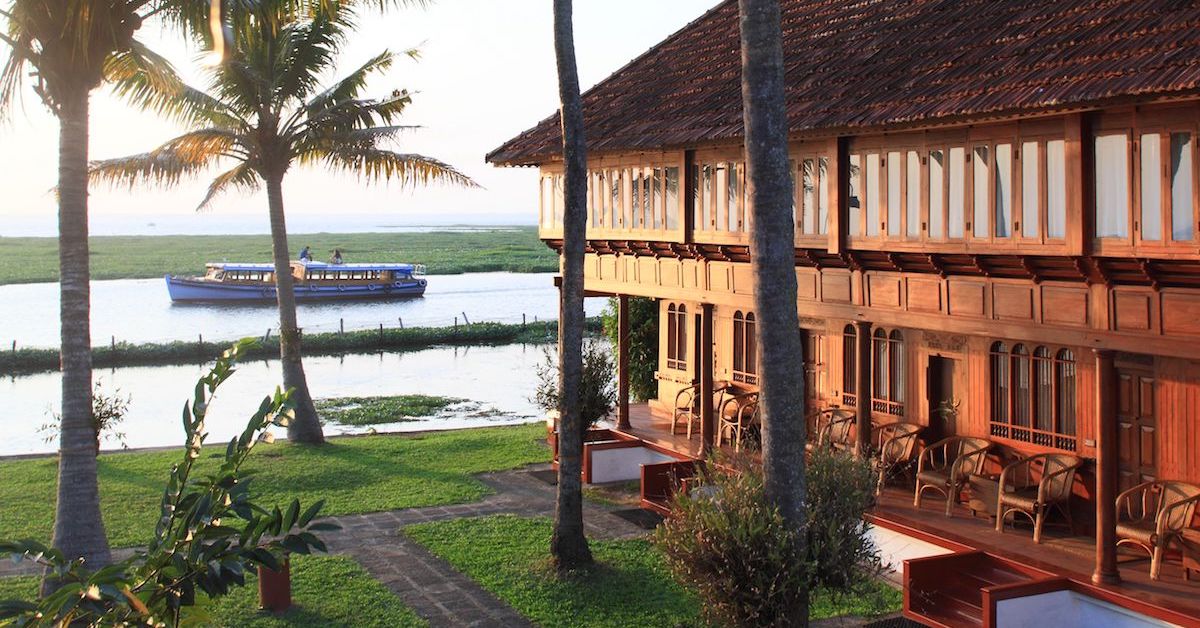We spend most of our time indoors. And that’s reason enough to care for a sustainable and climate neutral construction, that makes us happy and even more important, is also healthy. But still, everything does not always have to be new and super modern, in order to keep up the standards of a sustainable construction even in the following decades. With the help of restoring, old buildings can continue to be used. This is also smart, when thinking about the environment, because restoration and renovation not only stop the building from falling into ruin but also from being torn down, thus making the use of new construction materials obsolete. Adding to that, the old materials are mostly natural, since they come from a time where environmental toxins weren’t a topic just yet. This is an important aspect of sustainability that can also be applied on tourism. Many examples show how ancient buildings can be brought back to life with the help of sustainable restoring. In that manner, old traditions, especially in craftsmanship can be passed on to following generations.
Respect for an ancient art of craftsmanship
The CGH Coconut Lagoon Resort can only be accessed by boat and is located in Kuttanad in Kerala, India, amidst a labyrinth of channels, rivers and lagoons. 150 year old material, partially from deconstructed manors, has been used to build the eco-resort. The reconstruction has not been an easy process spending lots of love and just as much work. First, the descendants of the artisans that had originally built these houses had to be found, since the old craftsmanship is endangered. This mission resulted in a final team of men that were over 60 of age. Summing up, the affectionate way of working with the wood and the fine detailing of the manors in the Coconut Lagoon, are truly a homage to their specific knowledge, patience and dedication.
A silo made to stay
Today, the Hotel Speicher by the Ziegelsee lake in the „old harbor“ of Schwerin is a sustainably renovated hotel. The former grain silo has been built in 1939 as a massive steel construction, complete with an outer shell of brick stone, holding a total amount of 6,000t. Since the silo is under monumental protection as an industrial building, the monument’s pristine character had to be maintained. The reflection of the building’s individuality and uniqueness in the hotel rooms as well as in the public spaces has been crucial from the beginning. In that fashion, mushroom cap columns, made from reinforced concrete make for an architectural detail, which are visible in some rooms. Burnished iron has been used on many details in order to keep the house’s history alive. Old wooden windows have been restored lovingly and the broken hand formed brick stones on the outside of the building have been reused for the defenestration in the bar area. Adding to that, mostly natural materials have been used for the interior construction.
Open the door and be in the middle of South Tyrol’s nature
The Rainer family, who runs the hotel Josephus in the Schnalstal in South Tyrol, laid focus on the preservation of old textures and interpreting them in a new way, when they renovated the old countryside villa. That way, especially the regional, minimalist-rustic style has been picked up respectfully during the remodeling. Every wood found on the former barn was reused and partly supplemented with local woods. You will find natural plaster on the walls, that has been applied by hand, in order to maintain the character of the house. The furniture has been renovated while keeping the original design in mind. Also, the gorgeous nature with surrounding meadows and the creek in front of the house have been taken into account while planning and renovating. This allowed the construction of the spacious terrace with only a slight amount of ground shifting. The old farmer’s garden, including its local plants has been fully maintained. Various working processes were carried out by local craftsmen or even without any outside help. The Josephus stands for tradition, paired with a glance at the future.
Dusk at sea
Seaweed is a natural and also sustainable insulation material. The dead plants from the sea have a great ecological assessment, since they can be used almost completely unprocessed while simultaneously having ideal insulation qualities. As a matter of fact, seaweed is resistant against mold and vermin. The German company Neptutherm picked up the trend on the sustainable insulation material and has already insulated about 100 houses with seaweed in Germany, France, Luxembourg, and Switzerland. The seaweed mostly comes from Tunisia and Albania. So called „Neptunballs“ are the raw product and are picked by hand on the beaches of the Mediterranean Sea, thus providing jobs. Corresponding places of production are currently being planned in emerging countries. Despite the long distance of transport by ship or train, the ecological assessment is still better than comparable insulation materials, such as glas wool or styrofoam.
Perfect dialogue between tradition and modernity in the Allgäu Alps
The HUBERTUS Alpin Lodge & Spa treats nature’s resources carefully and mindfully. In this way, the house combines tradition and modernity in an unique fashion. Sparseness, coming from a farming culture shaped the family since the foundation in the fifties. The ambiance and a simple design dominate the picture. All along only pristine and fully grown materials are being used here. HUBERTUS’ outside facade is planked with natural wood shingles, while the interior is dominated by simple lines as well as bright and warm natural shades. Every floor and staircase is made of oakwood. Grout made from granite has been used in the recreation room as well as the kitchen. Also, the house’s own barn is 100 percent recyclable. Ecological materials, such as stones, brushed woods, linen and furs make the interior look equally stylish and close to nature. Furthermore, the preservation of context and culture is just as important as the successful fusion with nature with the help of local wood elements.
Just like home in an Albergo Diffuso in Italy
Former members of the Scalambrin family worked as shoe makers, innkeepers or butchers and were well known in their hometown. But time left some traces. In cause of necessity and the wish to maintain important historic family belongings and save them from possible decay, the family decided to restore the houses and transform them into a hotel. More specifically, into a so called Albergo Diffuso. Being a sustainable hotel concept, that does not construct new buildings, but rather emerging from empty vacation homes oder renovated houses. The hotel Relais del Maro opened its doors in 2012. While taking tradition and culture into account, the tasteful renovation took place with the sole use of local and natural materials.
Fairytale castle by Lake Constance
The history behind Schloss Wartegg has been ever changing. Located in East Switzerland, near Lake Constance, the castle is existing since 1557 and has, among other things, served as refuge and exile. In 1994 the Mijnssen family bought the ruinous castle and a great part of the english landscape park. The ecological and sustainable restoration of the building went on for four years, resulting in a beautiful feel good hotel. In order to achieve this state, massive regional wood as well as wood from the castle’s very own park was used. Today, the castle’s english landscape park is a recognized garden monument. Numerous cultural and artistic events, hosted by the Kulturverein Schloss Wartegg (cultural association of the castle) revive the castle as well as the park.




